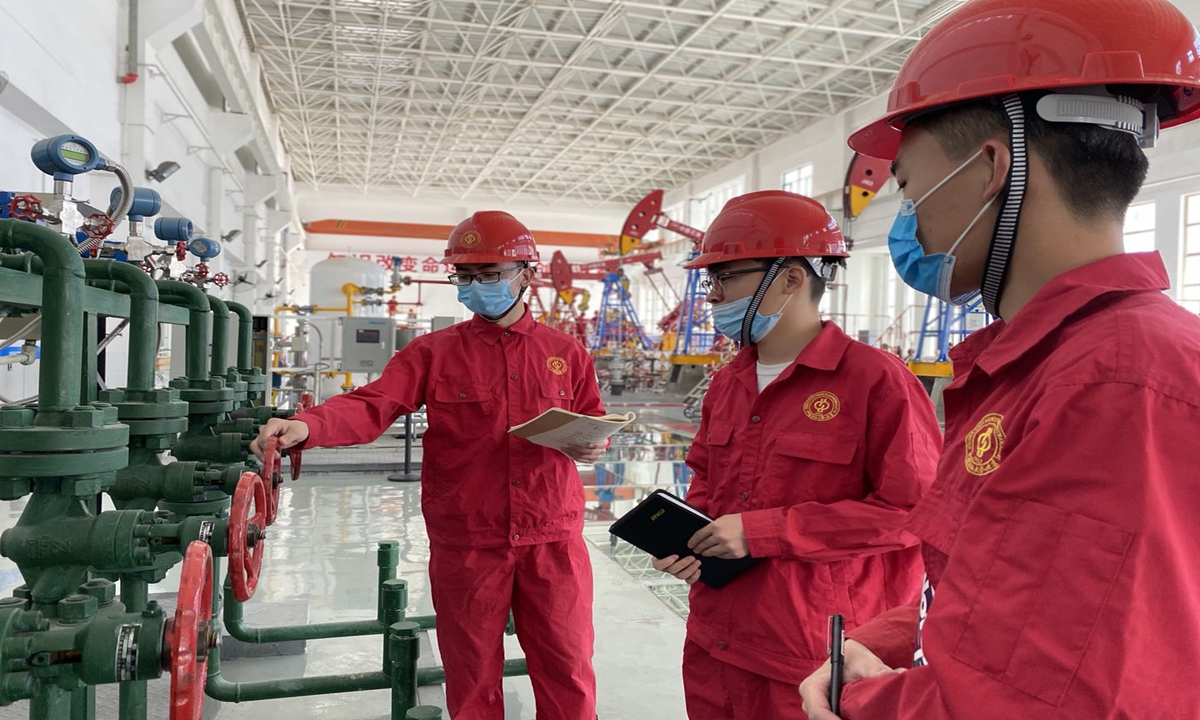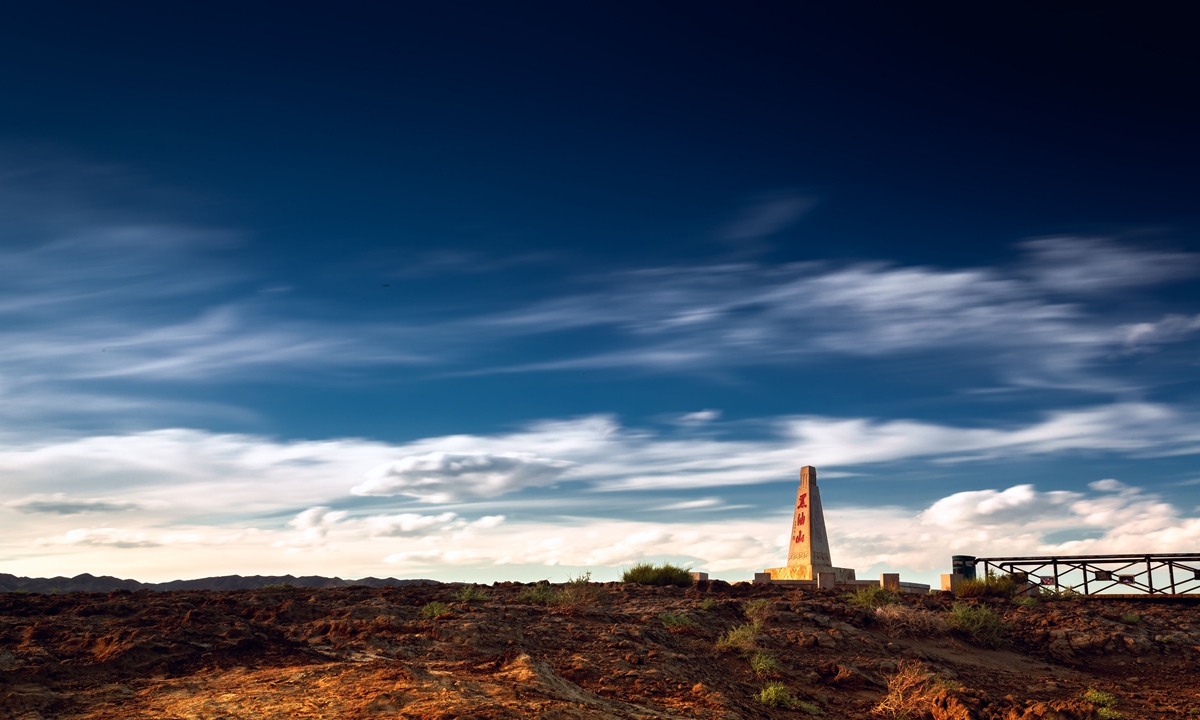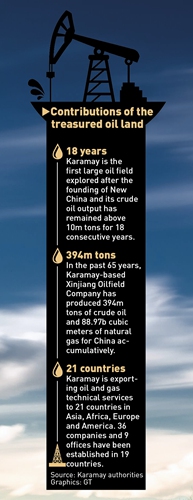Oil city in North Xinjiang endeavors to become heart of Eurasia
By Cao Siqi in Karamay Source: Global Times Published: 2020/9/23 18:02:05

Students on the Karamay campus of Beijing-based China University of Petroleum learn to operate equipment for petroleum and petrochemical production on September 8. Photo: Cao Siqi/GT
"In Uygur language, Karamay means black oil. Fifty years ago, we washed our faces, brushed our teeth, and did the laundry with hydrogen sulfide water. My grandpa therefore got skin diseases. At that time, it was more difficult to plant a tree in Karamay than to raise a baby. The smell in the air felt like rotten eggs ..." On the way to Baili Oilfield (100-kilometer-long oilfield) in Karamay, Northwest China's Xinjiang Uygur Autonomous Region, and having witnessed rows of oil extraction machines nodding in the field in order to provide a steady stream of power for the city and the country, 28-year-old Uygur Azu shared her memories with the Global Times reporter.
Azu is the third generation of oil workers here. No grass, no water, not even birds flying here - that's how her grandfather portrayed Karamay 60 years ago. But now, when the Global Times reporter walked into the city, it was hard to imagine that this modern international oil metropolis, known for its wilderness and fashion and rated as one of the safest, most civilized cities in China, houses the first cloud-based data center of technology giant Huawei in the country that used to be gobi desert.
Over the past 60 years, Karamay has undergone unprecedented changes, from poverty and backwardness to prosperity, from a vast gobi desert to a green garden, and from uninhabited to densely populated. All that Global Times reporter could feel here was the perseverance shown by generations of oil workers and Karamay residents coming from all over the country to achieve the goal of "digging oil for the motherland." It took these dreamers only three years to build an oil city on the desolate desert.
Now, amid the cooperation between the Silk Road Economic Belt and the Eurasian Economic Union, Karamay embraces a new opportunity. The city is building a new platform for Sino-Russian cooperation, hoping to better play its role as a bridge between China's Xinjiang and the adjacent regions of Siberia in Russia.

A view of the Black Oil Mountain in northeast of Karamay, China's Xinjiang Uygur Autonomous Region. The black asphalt mountain and the oil buried beneath it have lain dormant for millions of years. Due to the crustal changes, the underground oil seeped continuously and formed the mountain. Photo: Courtesy of Karamay city government
Like East Houston
Located on northwestern edge of the Junggar Basin in Xinjiang, Karamay has a total area of more than 7,000 square kilometers and a population of nearly 450,000. It is the only city in the world named after oil, which has been hailed as the holy land of China's oil industry.
On the way to the Baili Oilfield, a number of oil wells could be seen on the vast gobi desert, with no end in sight. The orange-yellow oil extraction machines, with a bow and a head up, repeated the same action, adding a bit of vitality to the silent desert. Local residents gave the oil extraction machine a very vivid and popular name: "kowtow machine." Whether it's windy or rainy, hot or snowy, day or night, the "kowtow machine" never stops. Every time it knocks its head, it is grabbing natural resources. It also seems that the kowtow refers to human beings' gratitude to the earth.
On a well-drilling site, the Global Times reporter met Liu Weidong, who had been working in the oil field for more than 30 years. Liu is the Party secretary and manager of a branch company under the Xinjiang Oilfield Company. When the latest COVID-19 epidemic struck Xinjiang, his oil well production base did not halt operation.
"All of our employees ate and lived on the site. We implemented strict epidemic prevention measures to make sure the site could still maintain production. If the site is shut down, the livelihoods of 20,000 employees in the oil field would be lost, and the city may not be able to function normally," Liu told the Global Times.
Karamay is the first large oil field explored after the founding of the People's Republic of China, and its crude oil output has remained above 10 million tons for 18 consecutive years. It has an abundant production capacity.
In the face of a harsh international environment where the US has launched a series of technological and resource blockades against China, Liu said that the impact on him is far-reaching.
"China's dependence rate on oil is about 70 percent, which has reached the international warning line. We are in a tough battle over oil reserves. This requires us to reduce costs while improving quantity. We are striving to raise our production by 30 percent every year," said Liu.
Without energy as a guarantee, a country will definitely not be able to develop. "We sing a song in every meeting to cheer each other up," he said.
In June, 118 graduates from the Karamay campus of Beijing-based China University of Petroleum said they decided to stay in Xinjiang and work at grass-roots level. During a visit to the campus, the Global Times reporter saw several students studying the new equipment attentively.
"Xinjiang residents have made great efforts to build the region. After having been through poverty and backwardness, we now have a stable hometown. The outside noises will not stir any wave and our lives and happiness depend only on us," Manzira, a student majoring in oil and gas geological exploration technology, told the Global Times.
Karamay has developed a complete and robust petroleum and petrochemical industry chain. So far, Karamay's engineering and technical service team has gone abroad with 34 scientific research institutions, and more than 100 local oil and gas technology service companies are providing services to 12 countries and regions including Russia, Kazakhstan, Sudan, and Pakistan.
Several reputed domestic and foreign companies such as Halliburton (DBS Drill), China Shipbuilding Industry Corporation, Baoji Steel Pipe Factory, and Jiangsu Jinshi Machinery Group have settled in Karamay. The China (Karamay) International Oil, Gas and Petrochemical Technology and Equipment Exhibition has also become the most influential petroleum equipment exhibition and trading platform in Western China and even Central Asia.

Full of vitality
Karamay is also a city full of vitality. It has established friendly ties with 15 cities in Asia, Europe, North America and other countries, and has established sister-city relationships with five cities in Russia, Kazakhstan, Pakistan, and Mongolia.
Since 2015, the China-proposed the Belt and Road Initiative has brought tremendous opportunities for the city.
"Karamay is located in the north passage of the Silk Road Economic Belt, which is our major focus to better integrate in the Belt and Road Initiative," Yan Lijun, deputy secretary-general of Karamay city government, told the Global Times.
The "focus" that Yan referred to is the areas of Novosibirsk, Omsk and Altai Krai in Western Siberia in southern Russia.
"We have done a lot of exchanges in humanities, science and technology, economy, trade, and culture in these two years. Novosibirsk is the third-largest city in Russia. The direct flight from Karamay to Novosibirsk only takes 1 hour and 40 minutes," Yan said.
According to Karamay's Bureau of Commerce, to open up the western trade channel between China and Russia, the bureau's first move was to introduce agricultural and sideline products from Russia. The bureau is also stepping up efforts in opening trade channels with Russia and building commodity and energy storage so as to promote tourism and trade.
Meanwhile, as Central Asia, with abundant oilfield resources, lacks technology, skilled workers and equipment, Yan noted that Karamay has sent a large number of oil and gas operation teams to the five countries. The city is also exporting technical services, petroleum equipment and materials.
So far, Karamay has established foreign trade exchanges with 28 countries in America, Europe, Africa, Central Asia, and South Asia, including the US, France, the UK, Russia, Ukraine, Afghanistan.
"Our next step is to introduce Russian agricultural and livestock products for further processing in Karamay," said Yan.
We hope that Karamay can further play its role as a key hub of the Silk Road Economic Belt, and make great progress in the construction of the north passage of the Belt and Road Initiative, Yan said.
Newspaper headline: Karamay: A glimpse of beauty in desert
Posted in: INDUSTRIES,BIZ FOCUS